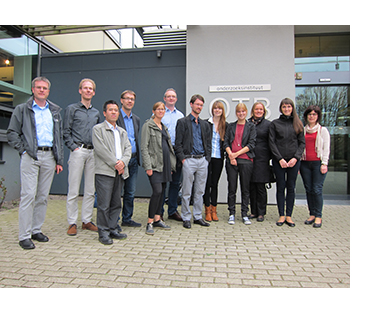

Socio-spatial inequality, deprived neighbourhoods, and neighbourhood effects (DEPRIVEDHOODS)
DEPRIVEDHOODS is a 5-year research project funded by the European Research Council with a 2 million Euro ERC Consolidator Grant awarded to Prof. Dr. Maarten van Ham from Delft University of Technology. The ERC project has started on the first of August 2014 with 10 researchers in four countries (Estonia, Sweden, The Netherlands, United Kingdom).

| Tiit Tammaru from the University of Tartu talks about socio-economic and ethnic segregation in neighbourhoods, and the conclusions of his time as visiting professor at the Faculty of Architecture and the Built Environment, TU Delft. |

Socio-Economic Segregation in European Capital Cities. East meets West (www.segregationeurope.eu)
 Edited by Tiit Tammaru, Szymon Marcińczak, Maarten van Ham, Sako Musterd
Edited by Tiit Tammaru, Szymon Marcińczak, Maarten van Ham, Sako Musterd
INCREASING SEGREGATION IN EUROPEAN CITIES DUE TO INCOME INEQUALITY.
The widening gap between rich and poor is leading to segregation in more and more European cities. The rich and the poor are living at increasing distance from each other, and this can be disastrous for the social stability and competitive power of cities.
The study is now available from Routledge publishing house through this link. The INTRODUCTION and CONCLUSIONS can be downloaded FREE of charge by following these links: Introduction & Conclusions.

The objective of DEPRIVEDHOODS is to come to a better understanding of the relationship between socio-economic inequality, poverty and neighbourhoods. The spatial concentration of poverty within cities is of great concern to national governments, partly based on a belief in neighbourhood effects: the idea that living in deprived neighbourhoods has an additional negative effect on residents’ life chances over and above the effect of their own characteristics. This belief has contributed to the development of area-based policies designed to introduce a more ‘favourable’ socio-economic mix in deprived neighbourhoods. Despite the persistent belief in neighbourhood effects, there is  surprisingly little evidence that living in deprived neighbourhoods really affects individual lives. There is little consensus on the importance of neighbourhood effects, the underlying causal mechanisms, the conditions under which they are important and the most effective policy responses. It is likely that most studies claiming to have found that poor neighbourhoods make people poor(er) only show that poor people live in poor neighbourhoods because they cannot afford to live elsewhere. DEPRIVEDHOODS will break new ground by simultaneously studying neighbourhood sorting over the life course, neighbourhood change, and neighbourhood effects, within one theoretical and analytical framework. This project will be methodologically challenging and will be the first integrated, multi-country research project on neighbourhood effects to use unique geo-referenced longitudinal data from Sweden, United Kingdom, Estonia, and The Netherlands. Special attention will be paid to the operationalization of neighbourhoods and how it affects modelling outcomes. Through its integrated and international approach, DEPRIVEDHOODS will fundamentally advance understandings of the ways in which individual out-comes interact with the neighbourhood, which will ultimately lead to more targeted and effective policy measures.
surprisingly little evidence that living in deprived neighbourhoods really affects individual lives. There is little consensus on the importance of neighbourhood effects, the underlying causal mechanisms, the conditions under which they are important and the most effective policy responses. It is likely that most studies claiming to have found that poor neighbourhoods make people poor(er) only show that poor people live in poor neighbourhoods because they cannot afford to live elsewhere. DEPRIVEDHOODS will break new ground by simultaneously studying neighbourhood sorting over the life course, neighbourhood change, and neighbourhood effects, within one theoretical and analytical framework. This project will be methodologically challenging and will be the first integrated, multi-country research project on neighbourhood effects to use unique geo-referenced longitudinal data from Sweden, United Kingdom, Estonia, and The Netherlands. Special attention will be paid to the operationalization of neighbourhoods and how it affects modelling outcomes. Through its integrated and international approach, DEPRIVEDHOODS will fundamentally advance understandings of the ways in which individual out-comes interact with the neighbourhood, which will ultimately lead to more targeted and effective policy measures.









